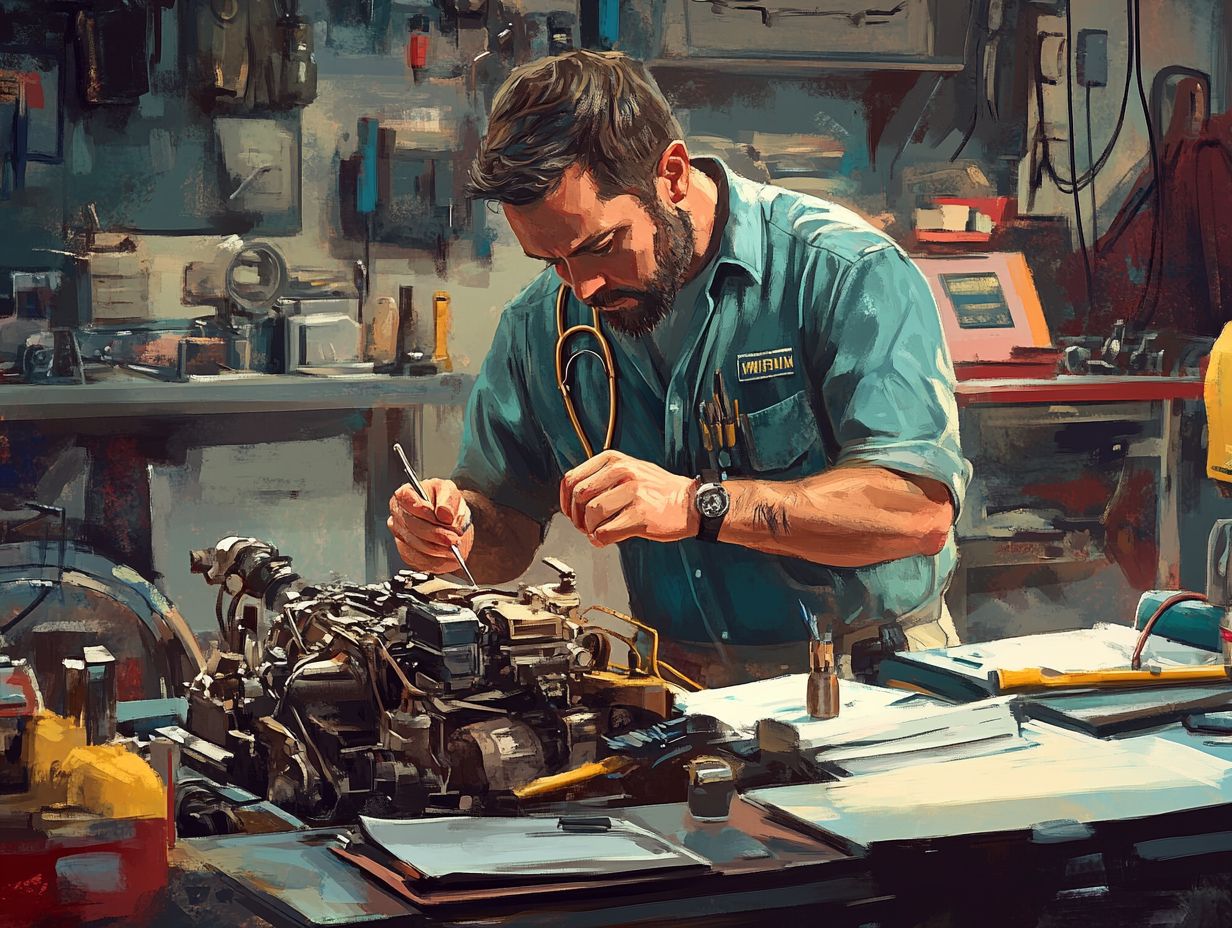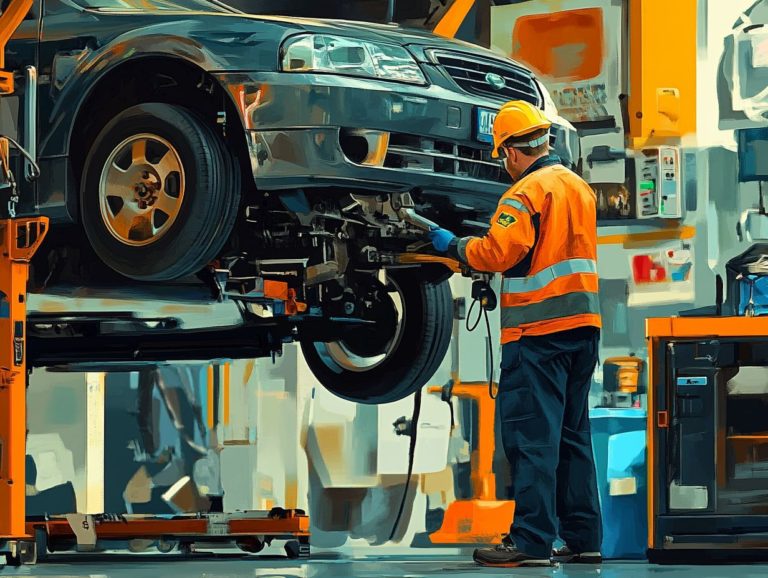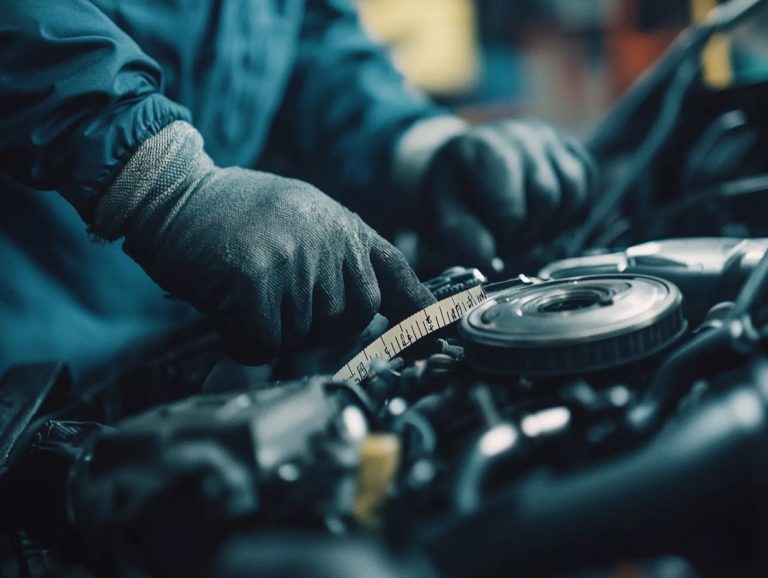How to Diagnose Common Car Noises?
Have you ever found yourself puzzled by unexpected noises coming from your car? From the soothing hum of a smoothly running engine to jarring clunks and squeaks, each sound reveals something about your vehicle’s condition.
This article explores various types of car noises, what they might indicate, and how to pinpoint their origins. It also discusses when to consult a mechanic and offers valuable tips for preventing these issues.
Prepare to elevate your understanding and become more attuned to your ride!
Contents
Key Takeaways:

- Pay attention to the type and frequency of car noises to identify potential issues.
- Use techniques like listening, visual inspection, and test drives to pinpoint the cause of car noises.
- If unsure, seek professional help to diagnose and address car noises before they become major issues.
Why Do Cars Make Noises?
Cars produce a symphony of sounds. Each note often signals underlying issues that require your attention. For example, a hissing noise could hint at a vacuum leak in the exhaust system. A clunking sound might suggest worn brake pads or suspension troubles.
Understanding these noises is essential for securing a timely diagnosis from a mechanic. Ignoring warning signs could lead to severe problems, like transmission failure or persistent ticking from the engine. Regular maintenance, such as checking your engine oil and power steering fluid, helps you identify these noises before they escalate into costly repairs.
If you hear a grinding sound while braking, address it immediately; it might signal issues with your brake pads. Similarly, peculiar noises when steering could indicate a problem with the power steering system. Listen for sounds from the air intake; they may suggest blockages or leaks affecting your vehicle’s performance.
By paying close attention to these auditory signals, you can enhance your safety on the road and keep your car running efficiently. Routine maintenance checks are crucial for detecting problems early, ultimately reducing the likelihood of expensive repairs.
Identifying Common Car Noises
Identifying common car noises is vital for car owners. These sounds often reveal critical insights into the vehicle’s condition. For instance, a hissing noise may hint at complications within the exhaust system, while a clunking sound might suggest issues with the suspension or worn brakes.
Grinding noises typically indicate brake pad wear or insufficient lubrication. Any steering noise might signal problems with the power steering fluid. By recognizing these auditory cues, you can take proactive steps to seek diagnostic services before more significant issues arise.
Types of Noises and Possible Causes
Understanding various types of car noises and their potential causes is essential for your vehicle s health and safety. For instance, a grinding sound often signals worn-out brake pads or insufficient lubrication. If you hear steering noise, it might indicate low power steering fluid or failing components. A hissing sound may suggest air leaks in the exhaust system. Each noise acts as a warning, urging you to investigate further.
Please don’t ignore those sounds! They could save you from costly repairs. For example, a squealing noise might indicate brake pads that need replacement, while clunking could hint at loose components.
Maintaining a vigilant approach to automotive sounds enhances your vehicle s performance and ensures safety on the roads. Unaddressed issues could compromise your braking abilities or steering precision. Regular check-ups and staying attuned to any changes in your car s noise are vital for preventing complications and maintaining overall vehicle longevity.
Diagnostic Techniques for Car Noises

Effective diagnostic techniques for car noises are essential for efficiently identifying and resolving vehicle issues. When your car starts making unusual sounds, like engine ticking or grinding, a comprehensive mechanic diagnosis can help pinpoint the underlying problems.
Regular maintenance, including checks for low lubrication and other warning signs, significantly reduces the risk of severe malfunctions. In many cases, seeking a professional diagnostic service can offer valuable insights into whether the issue is minor or requires immediate attention.
How Mechanics Diagnose Car Noises: Effective Methods Revealed!
Pinpointing the issue behind those perplexing car noises requires a systematic approach that elegantly blends various diagnostic methods. Mechanics often rely on their experience and training to recognize warning signs like unusual sounds, and knowing what to do when your car makes a weird noise can be crucial, as these noises might relate to engine oil, air intake, or even potential vacuum leaks.
By utilizing diagnostic tools like OBD scanners which read vehicle error codes they gather crucial data about your vehicle’s performance. This allows them to narrow down the possible causes of the noise. This meticulous method ensures that the underlying problem is accurately addressed, preventing any further complications down the line.
Mechanics perform visual inspections as well, checking belts, hoses, and connections for any signs of wear and tear that could contribute to your car s symptoms. They might even tap into their auditory skills, listening intently to discern subtleties in sound that might escape an untrained ear.
By combining these methods, they deliver a comprehensive assessment that ultimately leads to efficient repair solutions.
Understanding how these diagnostic techniques work not only helps mechanics tackle current issues but also enables car owners like you to appreciate the importance of routine maintenance and proactive vehicle care.
When to Seek Professional Help
Knowing when to seek professional assistance is crucial for you as a car owner, especially when you notice persistent warning signs that indicate potential underlying issues.
If your vehicle emits unusual sounds such as clunking or grinding, or if you observe signs of transmission failure or suspension problems, don’t wait! Consult a mechanic right away.
While regular maintenance is essential, there are times when the expertise of a professional becomes necessary to accurately diagnose and address complex issues that could compromise both safety and performance.
Signs That You Need a Mechanic
- If you hear clunking noises, it may indicate issues with your vehicle s suspension or joint components, hinting at potential structural failures that could compromise your safety.
- Grinding sounds, especially when braking, might signal severe wear on your brake pads. If left unaddressed, this could lead to damage to the rotors, resulting in costly repairs.
- Low lubrication levels can cause increased friction and overheating, potentially leading to engine damage. Ignoring these signs not only jeopardizes your vehicle s performance but may also lead to even more expensive problems if not promptly addressed by a qualified professional.
Preventing and Addressing Car Noises

Preventing and addressing car noises is essential to responsible car maintenance, ensuring your vehicle stays safe and reliable. By regularly checking key components like brake pads, engine oil levels, and power steering fluid, you can proactively tackle potential issues and minimize the chances of troublesome sounds, such as grinding or steering noise.
Embracing these preventative measures not only extends your vehicle’s lifespan but also elevates your overall driving experience.
Stay ahead of car problems schedule a maintenance check today!
Tips for Preventing Noises and Addressing Issues
Implementing practical strategies to minimize noise can significantly extend the lifespan of your vehicle. Start with routine maintenance, like checking brake pads and engine oil levels.
Also, keep an eye out for any signs of suspension issues. Maintaining proper tire pressure is crucial; it not only reduces noise but also alleviates unnecessary stress on vehicle components, enhancing overall performance.
By staying vigilant about these essential elements, you can greatly reduce the risk of unexpected breakdowns, ensuring a smoother and more enjoyable ride. Periodically inspect your brake pads for wear and replace them as necessary, since worn pads can lead to increased noise during braking, ultimately compromising safety.
Don t underestimate the importance of regular engine oil changes to maintain optimal performance; dirty oil can cause strain on the engine over time. Routine tire pressure checks also optimize fuel efficiency and improve handling and stability, contributing to a quieter and more pleasurable driving experience.
Frequently Asked Questions
How to Identify Noises that Indicate Car Issues?
1. What kind of noises should I be listening for when diagnosing car issues?
When diagnosing common car noises, listen for unusual sounds such as screeching, grinding, knocking, or clicking. For a detailed approach, check out how to diagnose common car problems.
How to Identify Noises that Indicate Car Issues?

2. Why is it important to diagnose car noises early on?
Diagnosing car noises early can save you from expensive repairs later. Ignoring strange noises can lead to further damage and higher repair costs.
How to Identify Noises that Indicate Car Issues?
3. What is the most common cause of a grinding noise when driving?
A grinding noise when driving is often caused by worn brake pads or rotors. Make sure to get these checked and replaced as soon as possible for safe driving.
How to Identify Noises that Indicate Car Issues?
4. What should I do if I hear a clicking noise when turning my steering wheel?
If you hear a clicking noise when turning your steering wheel, it could be a sign of a worn or damaged CV joint. Get this checked by a mechanic right away to prevent further damage.
How to Identify Noises that Indicate Car Issues?
5. Why is my car making a squealing noise when I start the engine?
A squealing noise when starting your car could indicate a loose or worn belt, such as the serpentine belt. Get this checked and replaced immediately to avoid potential breakdowns!
How to Identify Noises that Indicate Car Issues?
6. Can low engine oil cause unusual noises in my car?
Yes, low engine oil can cause various noises in your car, such as knocking or tapping sounds. It’s essential to regularly check and maintain your engine oil levels to prevent potential engine damage.






